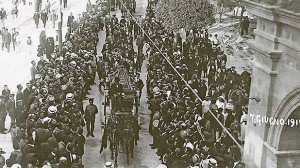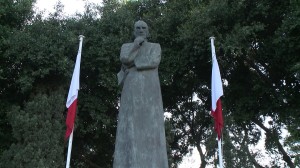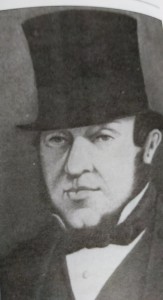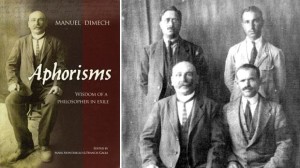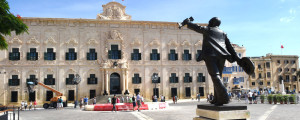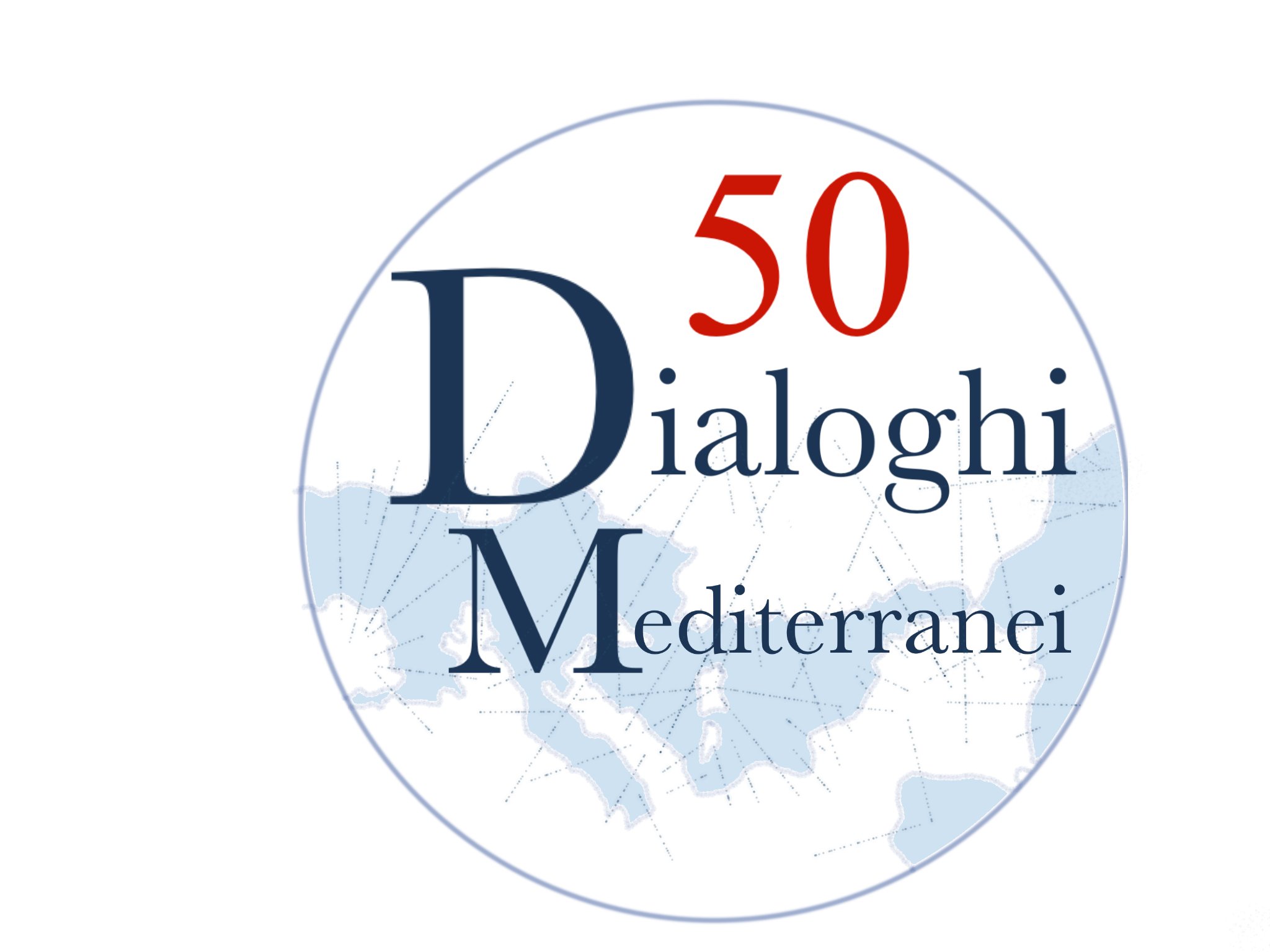di Arnold Cassola [*]
The Maltese socio-political background in the 19th century
Maltese Literature written in the Maltese language is quite a young literature. Apart from the 15th Century Cantilena and the 17th century Sonetto by Giovan Francesco Buonamico, one has to wait until practically the 19th century for Maltese writers to start writing in Maltese. Basically, until this time, from 1530 onwards, Maltese writers had written the bulk of their work mainly in the Italian of Tuscany, even though Arabic (three Maltese poets writing in the 12th century at the Palermo court of Roger II), Latin (Giacomo Bondin, with his Latin epigrams and Luca D’Armenia’s 1565, O Melita Infelix) and Sicilian (one poem in Marcello Attardo de Vagnoli’s 17th century Canzoniere; two poems in the 19th century newspaper Nafras u Colombo) had also been sporadically made use of by established Maltese writers (Cassola, 2000: 2-4; Cassola, 2011: 58).
The strengthening of writing in the Maltese language coincides with three important socio-political factors: first of all, the setting up of a permanently established printing press in 1756; secondly, the presence of hundreds of Italian Risorgimento exiles in Malta during the 19th century; and finally the granting of Liberty of Press by the British colonial power in 1839.
The first factor meant that the Maltese could finally start having their works printed in Malta. Until this time, apart from a short interlude between 1642-1656, all Maltese writers and intellectuals had to content themselves with either publishing their works abroad – normally in Italy – or leaving them in manuscript form. A printing press permanently established on the island provided a much greater and better possibility for the spreading of the written Maltese word.
The second signified that the island was “invaded” by a good number of the romantic Italian diaspora (including monarchists, and republican Mazziniani, etc), in particular after the 1848 failed uprisings in nearby Italy and Sicily, when the number of Italian exiles in Malta was just under one thousand. Many of these were members of the intelligentsia, people like Francesco Crispi, Ruggero Settimo, Luigi Settembrini, Francesco De Sanctis, Nicola Poerio, Gabriele Rossetti, etc., who spread their revolutionary romantic ideals in Malta (Bonello et al., 1982).
The third factor, the granting of Liberty of Press, meant that these ideals could be put down in writing and circulated in the various newspapers founded by the Italian Risorgimento exiles, who would thus influence Maltese intellectuals with their ideas on freedom from foreign dominion, on fraternity, nationalism, equality and all those values associated with the concept of “Religio et Patria”.
The British in Malta had encouraged the spreading of such political ideas since they reasoned out that the Italian exiles were working to oust the traditional enemies of the British Crown from Italian soil: ergo, the Austro-Hungarian Empire, the French Empire, the Borbonic crown, the Papal states. Little did they realise that the Maltese intelligentsia would be “infected” by these ideas! So contagious and convincing was the reasoning of the Italians in Malta that the Maltese writers started making these ideas their own … and eventually turned to the British authorities in Malta for the granting of all liberties.
On a political sphere, the Nationalist movement in Malta started in 1880. The Nationalist Party “was founded by Fortunato Mizzi in 1880 as the Anti-Reform Party, in opposition to taxation decreed by the British colonial authorities and standards to anglicise the educational and the judicial systems. The existence of Italian immigrants from the Risorgimento gave the party a liberal constitutionalist quality in the PN’s early days and a pro-Italian position which lasted up to the Second World War” (Politics of Malta).
Early romantic poets
Maltese writers started clamouring for more liberties started making their voice heard with regards to their political aspirations early in the 19th century. Already towards mid-century one starts finding Maltese poets extolling the praises of their country. For example, in 1852 Luigi Rosato, who also happened to be the first Maltese playwright to write in Maltese, states that Malta’s glorious history was renowned all over the world: (“Kull min jaqra jaf wisq tajjeb/ Din il-glorja mhix minsija,/ Ġewwa l-kotba, u sa f’ħitanek/ Tibqa’ dejjem imsemmija”. – Lill-Maltin [‘To the Maltese’]). All those who read know very well/That this glory is not forgotten/Both in books and in your bastions/You will always be remembered”) (Friggieri, 1987a: 85).
However, previously, the same Rosato (1795-1872), had given ample written proof of his attachment to the British crown. In a poem dedicated to Queen Adelaide, who was in Malta in 1838, he ends his poem Il-Migja fit-teatru tar-Regina Adelaide [‘Queen Adelaide’s visit to the theatre’], with the following lines: “Daqqew lilha l-ahhar daqqa,/ Sellmitilna tliet darbiet,/ B’ghajn hanina harset lejna/ Bhalma thares l-omm ‘l ulied./ Ghaliex sejra u ser thallina,/ Ghidt jien f’qalbi lir-Regina?/ Alla jtiha qatigh ghomor” [‘They played the last tune for her/She waved to us three times/She gave us a tender look/As a mother looks at her children/Why are you leaving us/I asked myself referred to the Queen?/ May God grant her everlasting life” (Friggieri, 1987b: 57).
Rosato is full of respect for our British colonial dominator, who is depicted as a loving mother, exhuding tenderness for her sons and daughters. The author does not want his “metaphorical” mother to leave him. He shudders at the thought of being abandoned by her. And, with a not so covert intertextual reference to the British national anthem, “Long live the Queen” are his final parting words.
Other 19th century authors are still quite servile in their attitude towards their British masters. For example, in 1865, in the poem Lilek Malta fl-aħjar sena [‘To you Malta, in your best years], reproduced in his history book Malta u l-Gżejjer tagħha [‘Malta and its islands’], Pietru Pawl Castagna states: “Imxejt dejjem mas-suvrani /Sew bħal kelb fidil lejn sidu,/ Raġun għandhom l-Anglikani/ Jitilfuk le ma jaħmlux;/ Li jħalluk dawn qatt ma jridu/ Allavolja ma taqblux (‘You [Malta] always followed your sovereigns/Like a dog faithful to its master,/The Anglicans are right/In not wanting to lose you;/They never want to leave you/Even though you do not agree”). Though highlighting the difference in religion, the Maltese being Catholic and the British being Protestant, the author still wants to stress the fact that the Maltese are loyal British subjects. In fact, the simile, “sew bħal kelb fidil lejn sidu” (‘like a dog faithful to his owner”) is given a positive rendering when, normally, this imagery is more often than not utilized to depict the attitude of a servile lackey.
Giovanni Antonio Vassallo
The first Maltese poet who openly starts criticising the rulers of Malta is Giovanni Antonio Vassallo (1817 – 1868). A lawyer and a professor of Italian literature at the University of Malta, Vassallo is considered to be the first significant Maltese poet writing in the Maltese language.
Vassallo’s patriotic verve, which also includes a severe condemnation of the foreign dominators of Malta, is already evident in his poem in four parts, entitled Mannarino. Gaetano Mannarino was a Maltese priest who had led a rebellion against the Order of St John of Jerusalem, in the last decades of its rule over Malta, in the latter part of the 18th century.
When addressing the Maltese people, Mannarino states:
Ilha wisq marida qalbi [My heart has been sick for so long
Fuq li ġralha din il-Gzira… ’Cause of what happened in this island …
F’kelma waħda rrid ingħidu In one word, I have to say
Aħna lsiera, Malta lsira! We are slaves, Malta is a slave!
Dawn ir-rħieb li fuqna jaħkmu These monks that rule upon us
Kull ġieħ tilfu, kull mistħija! Have lost all sense of honour, and of shame!
Jekk għat-tjieba ħrara kellhom If they were once keen on being humane
Ilu żmien li ġiet mitfija. They lost this virtue long ago.
Il-wegħdiet tas-slaten mejta The promises of the dead sovereigns
Minn tal-lum ġew miksurin, Have been broken by today’s rulers,
Il-jedd kollu ġewwa idejhom… They’ve appropriated themselves of all power…
X’jedd fadlilna ja Maltin? What rights are left for the Maltese?]
(Friggieri, 1987b: 71)
In the space of 12 lines, Vassallo manages to pinpoint both the malaise of the Maltese population and the arrogance of their foreign rulers through the use of lexes which give a very strong negative rendering of the whole situation: the adjectives marida (the sick Maltese heart) and miksurin (all past promises broken by the present leaders); the nouns lsiera, lsira (the Maltese represented as slaves); the verbs jaħkmu (which renders well the idea of oppression), tilfu (all their lost honour and sense of shame), ġiet mitfija (the stifling of all yearning towards a humane behaviour).
The helplessness of the Maltese people is synthesised in the antithetic contrast contained in the two last quoted verses: all power concentrated in the hands of the foreign dominators – No rights at all for the Maltese. In this clash of opposing imagery (all power – no rights), Vassallo is very skilful in creating a very effective poetic effect through the use of the same word (jedd) which is utilised in its two different signifiées of ‘power’ and ‘rights’.
Vassallo’s “exile” poem “It-Turufnat” [‘The Exile’] is an overt political poem (Cassar Pullicino, 1955: 14-16). Whilst in other migration poems by Vassallo, poverty and lack of work opportunities had been the reasons behind the protagonist’s forced migration abroad, here the hero is banished from his homeland because of his political stand against the rulers of his country. The situation is a highly idealised one, since it might not reflect the real circumstances of Vassallo’s life, even though, in reality, he had spent a short period of his life as a migrant (1844-45) in Alexandria, Egypt.
It-Turufnat is an address to the unnamed exile’s beloved land (art maħbuba), where he yearns to return in order to embrace it before death overcomes him (“Illi nbusek inħoss xewqa kbira,/ qabel ġismi jinwiret mit-trab” [‘I strongly wish to kiss you,/Before my body is inherited by dust’]). The protagonist then turns on to attack the powers that be – Il-Kbarat- who are considered to be the real cause of his exile. They are considered to be undemocratic leaders (“Ja nies ħżiena” [‘You bad people’]) who oppress their people and limit their freedoms and rights ( “.. jedd il-bniedem/ Li bil-qawwa rajt minnhom meħud” [‘People’s rights/That are forcefully taken away from them’] ).
Vassallo rebels against this injustice and promises to continue fighting for the rights of the common citizen till death (“Jedd il-bniedem inxandar sa mmut!” [‘I will speak up about the people’s rights till death’]). The despotic attitude of the rulers of Malta knows no bounds, so much so that they are also the cause of infinite suffering to the exile’s wife and children. They thus deserve the appellation of Misħutin [‘Cursed people’] and nies kiefra [‘cruel people’].
Though the thought of death and suicide does cross the exile’s mind, the memory of his wife and children keeps him going. Though physically shattered, morally the exile keeps up his fighting spirit and indeed he exhorts his wife to instil into their children this same fighting spirit by urging them to continue to expose the wrongdoings of the political leaders (“Tal-Kbarat ħlief il-ħazen turix” [‘The mischief of the powerful, do not hesitate to expose’]).
It is obvious that, though the British are never mentioned by name, the implicit references in this poem are to them. One can safely state that the spirit of the Italian Risorgimento is strongly behind Vassallo’s thoughts and words.
This impotence and helplessness of the Maltese people is further highlighted in a number of angry poems written by Richard Taylor (1818-1868). Unlike Vassallo, Taylor was not diplomatic at all in his words. If Vassallo does not mention openly the targets of his criticism but defines them generically as kbarat [‘the powerful ones’], Misħutin [‘Cursed people’] or nies kiefra [‘Cruel people”], Taylor is much more specific and precise. The object of his wrath is the representative of the British Crown in Malta and he has absolutely no qualms in declaring this openly.
Taylor wrote all kinds of poetry ranging from the satirical to the religious to the political. The year 1846 marked a number of very poignant and sharp ‘political’ poems. The inspiration for all these was derived from an episode that happened on the 22nd February of that year. It was the carnival period and the British Governor of the time, Sir Patrick Stuart, decided not to allow any carnival masks in the capital city, Valletta, on Carnival Sunday. The Maltese people protested against this directive, and a good number of them ended up being beaten up, arrested and condemned to jail sentences.
These events became the talk of the town and inspired Taylor to write a number of different poems. In Il Mitra, jew il-lixka tal-Imzazen [‘The Mitre, or the goby-fish bait’], he speaks out openly against the arrogance of the British dominator:
War’ li demmna lkoll ċarċarna [After we all shed our blood
Biex inkeċċu lill-Franċiżi, To get rid of the French,
Ħlejna djarna, il-ġuħ batejna We consumed our riches, we suffered hunger
Biex bi gvern naħtru l-Ingliżi. To put the English in government.
Dan hu l-ħlas? Din hi l-imħabba? Is this how we are being repaid? Is this love?
Li jagħfsuna lkoll kuljum? That they squeeze us every day?
Minn kull dritt hawn lilna jneżżgħu, Of every right they want to undress us,
Sa jneħħulna kull kostum!…. Leaving us entirely naked!….
L-ewwel ħaġa li neħħewlna The first thing they deprived us of
X’ħin kien Ball governatur: As soon as Ball became governor:
Il-Kunsill, l’huma l-Ġurati; The Council, with its Councillors;
Hux biċ-ċar l’hu traditur? Isn’t it clear that he’s a traitor?
Kif qatt setgħu jneħħu d-dritti How could they ever take the rights
Minn dil-gżira, fis weġbuni? Of this island, please answer me?
Li tlabnihom li jixtruha Had we asked them to buy it
Kienu jtuna wisq miljuni. They would have paid many millions for it.
Aħseb u ara tajnihielhom Let alone when we gave it to them
Biss bil-patt tad-dritti tagħna! On condition they would safeguard our rights!
Tatux tort iżda r-Reġina, However do not blame the Queen,
‘Ma xi erbgħa li hawn magħna!….. But some others who are here with us! ….]
(Cassar Pullicino, 2001: 170)
Taylor is very open in his harsh criticism of the British. In order to give vent to his anger, he goes back in history for around half a century and reminds one and all that in 1800 the Maltese had shed a lot of blood in the two year uprising against the French oppression and had then ‘invited’ the British to oversee the proper governance of the island, in the name of the King of Naples.
But the British had betrayed the trust that the Maltese had put in them (“Dan hu l-ħlas?/Din hi l-imħabba?” [‘This is the repayment/This is the love’?]) and instead of ‘loving’ the Maltese for their having risen against their French oppressor (“War’ li demmna lkoll ċarċarna/ Biex inkeċċu lill-Franċiżi” [‘After we all shed our blood/ To get rid of the French’]), they ended up depriving them of all basic rights (“Li jagħfsuna lkoll kuljum?/ Minn kull dritt hawn lilna jneżżgħu” [‘That they squeeze us every day?/Of every right they want to undress us’]).
One cannot but note the insistence on the word dritt/dritti, to signify the fact that the Maltese were to be considered a free people, masters of their own destiny ‘by right’. The concession of Malta to the British was conditioned to the recognition on the part of the British of this basic right. Instead, the British totally ignored this.
This systematic despoliation of the rights of the Maltese started immediately, under the governership of the first British Governor Alexander Ball, who is considered by Taylor to be a traitor, on the grounds that he had deprived the Maltese of their right to a representative Council (“Il-Kunsill, l’huma l-Ġurati;/Hux biċ-ċar l’hu traditur?” [‘The Council, with its Councillors;/Isn’t it clear that he’s a traitor?’]). This affront is considered to be even more serious by the Maltese poet, when keeping in mind that the British had been ‘invited’ by the Maltese to Malta and had not taken it as a prize of war. Taylor values his homeland so much that, had it been up for sale, Malta would have been worth millions of pounds (“Li tlabnihom li jixtruha/ Kienu jtuna wisq miljuni” [‘Had we asked them to buy it./They would have paid many millions for it’]).
So it was utterly cheeky of the British rulers who, having been invited over to administer the island in exchange for the bestowal of all basic rights on the Maltese population, abused of the Maltese goodwill and rode roughshod over this agreement. In his scathing criticism of this behaviour, Taylor makes it amply clear that it is not the Queen of England who is to bear the brunt of the Maltese people’s anger, but her representatives on the island, who had abused of her and the Maltese people’s trust (“Aħseb u ara tajnihielhom/ Biss bil-patt tad-dritti tagħna!/ Tatux tort iżda r-Reġina,/‘Ma xi erbgħa li hawn magħna!…..” [‘Let alone when we gave it to them/On condition they would safeguard our rights!/However do not blame the Queen,/But some others who are here with us! ....’]).
Taylor’s harsh criticism is therefore clearly aimed at and focused on the representatives of Her Majesty on the island. If, in the poem just analysed his censure of Malta’s first Governor, Alexander Ball, was clearly expressed, in another poem contained in the pamphlet Id-Dispotiżmu u l-Inkwiżizzjoni fuq Malta mgħottijin fil-Parlament bil-Ħjiena [‘Despotism and Inquisition in Malta covered up in Parliament through deceit’], published in the same year, he admonishes directly the Governor of the day, Sir Patrick Stuart:
Kif dal-Gvern (hemm Hume qalilhom) [How does this government dare (there’s Hume to tell them)
Jikser jiġi l-pattijiet? To break up the agreement?
Fejn dil-Gżira mal-Brittanja When this island with Brittania
B’ġurament kellha l-wegħdiet!… Had sworn promises!…
Jiġi f’daqqa jindaħlilhom All of a sudden he interferes
Fid-drawwiet antiki tagħhom, In their old traditional customs
Fejn il-Gvern kien pleġġ daħlilhom After the government had solemnly pledged
Li kull dritt sħiħ jibqa’ magħhom!…. That all rights would remain untouched!…
Imur hemma f’dik il-Gżira He goes there in that island
(Raġa’ qal lill-membri lkoll) (He again told all members)
Jindaħlilhom sa f’liġihom He even interferes in their laws
Fejn igħinha jmissu wkoll. When he should instead be helping out.
U fost dan l-għemil hekk kiefer And in the midst of such harsh treatment
Il-Gvern jaħbat għall-Maltin! The governmetn hits out at the Maltese!
F’nofs ta’ triq bil-bajjunetti In the middle of the streets charging with bayonets
U bl-iżbirri misħutin!…. And also the cursed police!….]
(Cassar Pullicino, 2001: 170)
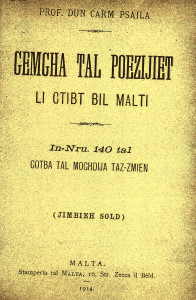 If in the previous poem, the accent had fallen on the word ‘rights’ (dritt/dritti), here the focus is all on the concept of “promise/promises”. The British had undertaken to respect precise conditions, when taking over Malta. They had signed pattijiet (‘agreements/pacts’); they had solemnly made wegħdiet (‘promises’), they had pledged (pleġġ) their respect of the rights of the Maltese. But, contrary to all their promises, they acted in the most dishonest of ways and, after the series of nouns denoting ‘promises’ (pattijiet, wegħdiet, pleġġ), Taylor lines up a series of verbs that denote the breaking of all these promises on the part of the British. Ergo, Jikser (‘to break’ – the promises), jindaħlilhom (‘they interfere’ – with regards to Maltese traditions and customs), jaħbat (‘they attack’ the Maltese population).
If in the previous poem, the accent had fallen on the word ‘rights’ (dritt/dritti), here the focus is all on the concept of “promise/promises”. The British had undertaken to respect precise conditions, when taking over Malta. They had signed pattijiet (‘agreements/pacts’); they had solemnly made wegħdiet (‘promises’), they had pledged (pleġġ) their respect of the rights of the Maltese. But, contrary to all their promises, they acted in the most dishonest of ways and, after the series of nouns denoting ‘promises’ (pattijiet, wegħdiet, pleġġ), Taylor lines up a series of verbs that denote the breaking of all these promises on the part of the British. Ergo, Jikser (‘to break’ – the promises), jindaħlilhom (‘they interfere’ – with regards to Maltese traditions and customs), jaħbat (‘they attack’ the Maltese population).
The concept of illegimate interference in the internal affairs on the part of the British is reinforced through the insistence on the use of the word jindaħlilhom. Not only do the British break their promises, which they had sealed through a solemn oath (ġurament), not only do they dare interfere by disrupting centuries old Maltese customs (“Fid-drawwiet antiki tagħhom”), not only do they ignore and disrupt Maltese law (“Jindaħlilhom sa f’liġihom”), but they even have the temerity to physically attack the Maltese population in the streets, by means of the hated police (żbirri misħutin) and, presumably, of the bayonet charging army soldiers (“F’nofs ta’ triq bil-bajjunetti”).
Taylor was not content at just denouncing these illegalities. He did not limit himself to reacting but was a a proactive person and therefore he spurred on his compatriots to publicly reprehend this unacceptable treatment by denouncing Stuart’s behaviour directly to the authorities in Britain:
L-ewwel nett hemm bżonn li nagħmlu [First of all we must gather
Petizzjoni lkoll flimkien: A petition all together:
Nibagħtuha l-Ingilterra We will send it to England
Mingħajr l-ebda telf ta’ żmien. Without wasting any time.
Fiha d-dritti tagħna nuru In it we will highlight our rights
U l-wegħdiet illi wegħduna: And the promises they had given us:
Nuru wkoll il-gvernaturi We will also show the governors
B’liema mod qegħdin jaħqruna. In what way they are oppressing us.]
(Cassar Pullicino, 2001: 170)
He therefore exhorts his compatriots to bypass the British authorities in Malta by appealing directly to Parliament and to Her Majesty in England. This was to be done through a popular petition signed by the Maltese, which was to be presented to the authorities. This petition was to highligh: 1. The inalienable rights of the Maltese (dritti), 2. The broken promises of the British to the Maltese (“l-wegħdiet illi wegħduna”) and 3. The cruelty of the British governors in Malta (“Nuru wkoll il-gvernaturi/B’liema mod qegħdin jaħqruna”).
Basically, in 1846 Taylor was proposing in verse the utilization of a political instrument, the popular petition, that Camillo Sciberras and Giorgio Mitrovich had already made use of 14 years earlier, in 1832. The two, who were influenced by the ideals of the French Reviolution, together with around 28 other Maltese liberals, had founded in 1830 the Comitato Generale Maltese, with the aim of presenting popular petitions to the British.
The Comitato presented two petitions to Governor Ponsonby in 1832 and both had the following demands:
the limitation of the Governor’s power
the setting up of a Consiglio di Nativi with 30 members as a local Council of Government
the reform of the Criminal Code which was outdated
the increase in the salaries of Maltese employed by the Government
the reduction in custom duties on wheat and other food items
the introduction of incentives to merchants and farmers
In 1835 the British Secretary of State, Lord Glenelg, granted Malta a Council of Government. But this Council fell short of Maltese expectations for it consisted only of 3 Maltese and 4 British nominated members. In 1835 George Mitrovich obtained permission to go to London and present another petition in the House of Commons. The petition was entitled The Claims of the Maltese People founded upon the Principles of Justice. It described the Council of Government as ‘an insult to the Maltese nation’. Many British Liberal MPs supported Mitrovich’s claims. Even the Governor in Malta had been disappointed since he had preferred a majority of Maltese members in the Council.
So, basically, in his poetical works Richard Taylor is availing himself of Sciberras and Mitrovich’s experience, by skipping the petitioning phase to the local authorities and addressing himself directly to our colonisers in Britain. The issues mentioned by Taylor are also a continuation of some of the issues brought up earlier by Mitrovich and Sciberras.
The incompetence of the British Governors in Malta does not end with the resignation of Governor Stuart in 1847. Taylor comes to the conclusion that it was also the top Maltese Civil Servants who contributed to the condition of slavery (jasar) of their fellow countrymen, towards whom they showed no mercy.
A poem which appeared in Il-Ġurnal Malti [‘The Maltese Newspaper’] in 1865 reinforces this concept, since the idea of hemm (‘suffering’) and jasar (‘slavery’) being forced upon the people is associated with the top echelons of the Maltese Civil Service, who had basically assimilated themselves to the British rulers in order to enter into their favours:
Min ma jafx hemm x’jiġifieri All those that do not know what suffering means
Jaqra fis dil-werqa tagħna; Should immediaely read our newspaper
Jara l-jasar ta’ dil-gżira And note the slavery in this island
Nistednuh biex jibqa’ magħna! We invite him to stay with us!
Kif tjassart, ja Malta msejkna How were you enslaved, poor Malta
Bl-impjegati kbar Maltin? By highly placed Maltese employees?
Wieħed biss fiċ-ċorma kollha In all this gang not one
Ma ssibx żgur l’huwa ħanin … Would be found who acts humanely
(Cassar Pullicino, 2001: 173)
As always, however, Taylor continues to distinguish between the ‘corrupt’ representatives of the British Crown, i.e. the Governors together with the leading members of the Maltese Civil Service, and the Queen herself, who is held in high esteem and described in the most enthusiastic of terms, as in the poem Is-Sultana Ommna Vittorja [‘Our Queen Mother Victoria]:
Hi s-sultana minn tas-slaten, [She is the Queen of all queens,
Hija l-aqwa u l-akbar driegħ! She is the best and the strongest one!
Għajtu Viva bħalma jgħajtu Shout Evviva as they also do
L-art, u l-ibħra, sa ġol-qiegħ! Earth, and the seas, to their very bottom.
Viva mmela l-gran Vittorja Therefore Evviva to the great Victoria
Għajtu, l-aħwa, għajtu sħiħ… Shout my brothers, shout loudly…
Biex l-għajjat ta’ wliedna jasal So that the shouting of our children will be carried
Bl-akbar ħrara fis mar-riħ. With great eagerness by the wind.]
(Cassar Pullicino, 2001: 172)
This ‘Queen of all queens’ is acclaimed and recognised as the best and the most powerful protector of her subjects (‘Hija l-aqwa u l-akbar driegħ!’) not only by the Maltese and their offspring (aħwa, wliedna), but even by the elements of nature, so much so that it is the seas and the earth that shout their praises to the “Gran Vittorja”, while it is the wind (riħ) that carries these praises from the Maltese shores to faraway Britain, where the Queen resides.
Finally, in his ‘exile’ poem L-Eżilju [‘The Exile’] (Friggieri, 1987b, 145-146), the poet imagines himself to be an immigrant in Bona, Algeria, home to thousands of Maltese economic migrants in the course of the 19th century. Taylor had, in fact, during his lifetime, migrated to Northern Africa for a period of time, including in Egypt. In this poem, Malta is described in the worst of terms: the conditions of living on the island are characterised by “ġuħ u għaks” (hunger and suffering) , “hemm” (misery and hardship) and “tgħakkis” (oppression). The protagonist is forced to emigrate because of all this, but what worries the author most is that there is no remedy for these awful conditions and that his offspring and future Maltese will have to live with.
The reason behind this state of misery and oppression is openly stated: it is the lack of basic freedoms, as the result of the actions of a despotic government, that is causing such hardship to the Maltese (“Kemm il-gvern idum despotiku,/ Taħtu jbati żgur kolħadd” [‘Until the government remains a despot,/Everybody will suffer under it’]). The lack of democracy and basic freedoms is tantamount to hardship and suffering for all the common people.
Taylor is here explicitly accusing the British authorities in Malta of neither providing proper education for the Maltese people nor opening up avenues for them to improve commerical relations with their neighbours (“La jgħallimna jrid l-iskejjel,/ La kummerċ ma jrid jgħin”). The neglect in which the colonial masters kept the population forced many to go abroad to earn a living and, therefore, emigration was not an incidental episode but the consequence of undemocratic political decisions … or the programmed lack of any political decision.
Ġużè Muscat Azzopardi
Another important figure in the development of Maltese literature is Ġużè Muscat Azzopardi (1853-1927), who is known as the father of Maltese Literature (“Missier il-letteratura Maltija”). He is better known as a novelist, as he is the author of various historical novels with a Maltese background. He was also a Member of the Council of Government.
Basically, in his historical novels Muscat Azzopardi followed the example provided by the Italian politician-writers of the Risorgimento, foremost amongst whom was Alessandro Manzoni. He therefore chooses historic episodes from the Maltese past and builds his plots around them.
In these novels the Maltese protagonist is always a heroic one, endowed with all virtues, whilst the foreign ruler of Malta -with his local cronies- embodies all the worst vices. These foreign dominators, together with the foreign enemy – normally the Turks representing Islam, oppress the Maltese and deprive them of all their rights and wealth.
In the end, the Maltese protagonists who are normally backed by the representatives of the Catholic religion, and therefore have God on their side, end up victorious and triumphant over the corrupt foreign dominationg rulers. The reference to the British protestant rulers of Malta is implicit in many of these Maltese historical novels.
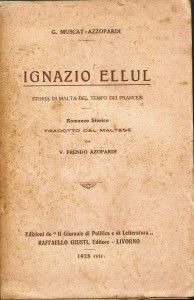 Muscat Azzopardi is also author of poetical works. His sonett X’irridu u ma rridux! [‘What we want and what we don’t want’] (Friggieri, 1987b: 192) is an open declaration of what the Maltese people want for themselves. First of all, Mitrovich, Sciberras adn Taylor’s request is again forcefully repeated: the Maltese want “self government” through a Council of the People (“irridu niggvernaw ‘il Malta tagħna/b’Kunsill tal-Poplu” [‘we want to govern our Malta/through a People’s Council’]).
Muscat Azzopardi is also author of poetical works. His sonett X’irridu u ma rridux! [‘What we want and what we don’t want’] (Friggieri, 1987b: 192) is an open declaration of what the Maltese people want for themselves. First of all, Mitrovich, Sciberras adn Taylor’s request is again forcefully repeated: the Maltese want “self government” through a Council of the People (“irridu niggvernaw ‘il Malta tagħna/b’Kunsill tal-Poplu” [‘we want to govern our Malta/through a People’s Council’]).
Secondly, Muscat Azzopardi declares that the British governing bodies must not increase taxes and must keep on utilising the Italian language as the foremost medium of expression of the Maltese, in schools and in the law-courts. Thirdly, he insists on the necessity of having just and understanding leaders (Kapijiet) and workers, whose main priority should be the general welfare and not their personal benefit. And, finally, the author insists on the fact that the Maltese population should be given all the rights that were due to it.
Though the leit motif of this sonnet is “e non vogliam Tedeschi!” [‘We don’t want any Germans’], which is taken from a work by the 19th century Italian romantic poet Giuseppe Giusti (1809-1850), a poet who had yearned for the independence of Italy, in reality Muscat Azzopardi’s message is directed towards the British, whom he declares to love passionately (“Kemm inħobbuha … l-Ingilterra” [‘We really love England’]).
England could not break her promise (“bħalma wegħditna” [‘as she had promised us’]) not to increase taxes and to maintain the primacy of the Italian language; England had to give the Maltese the Kunsill tal-Poplu [‘Council of the People’] that it had promised; England had to safeguard all the rights (jedd) that were due to the Maltese by right (jmissna). Were these pacts to be broken, I have absolutely no doubt that the refrain would have changed from “e non vogliam Tedeschi!” to u ma rridux Ingliżi! [‘And we don’t want the English’].
Manwel Dimech (1860-1921) was a precursor of the Labour Movement in Malta. He was editor and animator of the newspaper Il-Bandiera tal-Maltin [‘The Maltese Flag’] as from 1898 as well as the founder of Ix-xirka tal-Imdawlin [‘The Society of the Enlightened Ones’], which expounded on the illuministic principles. For his intellectual activity against British rule, he was exiled to Alexandria in Egypt in 1914, when the first World War broke out. For his times he was considered to be quite a rebel.
Being a man of strong socialist leanings, Dimech produced writings which are undisputedly of a very militant nature, and his poetry can, without any shadow of doubt, be termed political poetry. If, under the influence of Italian Risorgimento exiles, Vassallo and Taylor had imagined themselves to be political exiles, Dimech, with his fiery and revolutionary writings, must be considered to be a veritable political deportee.
In his poem Warda fuq il-Qabar ta’ Dun Gaetan Mannarino [‘A Rose on Gaetano Mannarino’s Tomb’] (Friggieri, 1987b: 250), he revers the revolutionary priest already praised by G. A. Vassallo. For Dimech, Mannarino is the most courageous of Maltese patriots (“Raġel bħalek sħiħ u qlubi/s’issa le ma nsab imkien” [‘Such a courageous man as you/Has yet to be found’]).
Of course Mannarino was active during the time of the Knights of Malta, but Dimech’s conclusion that the day when Mannarino would again be able to address the Maltese was yet to come (“Il-jum għad jerġa’ jiġi/ Li fih tkellem lill-Maltin”) clearly indicates that Manwel Dimech still considered the Maltese of his day to be oppressed and not masters of their own destiny. The day of real liberation was still yet to come.
The concept of ‘oppression’ is reinforced in L-Innu Malti [‘The Maltese Anthem’] (Friggieri, 1987b: 245), where the author starts off the poem utilising stock phrases and words taken from the Catholic liturgy ‘So be it! Amen’ (hekk ikun!, Amen) and placing them in a strong political context. The Maltese have woken up (Stenbaħna) and are not ready to accept the impositions of their enemies (għedewwa).
The poem is written in the present tense because Dimech is not referring to a period of past Maltese history. He is not referring to a historical event of years gone by: this situation of oppression and repression is something which his contemporaries had been going through… and now was the time to rebel against it. The courageous Maltese (qalbenin) of his times would never accept the condition of slavery (jasar). They were ready to fight for their rights and they would any day have preferred death, or a thousand deaths (Mewt! Elf Mewt!) to being deprived of their freedom. Better to die fighting the oppressor than to live the life of an enslaved person (“jibqa’ is-sejf; le ma nerħuħ”).
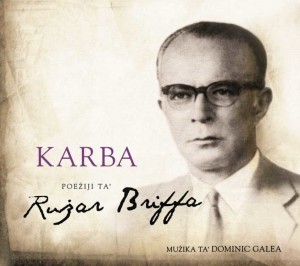 The author’s conclusion is that, for the love of one’s country, one should be able to look death in the face, and be prepared to die fighting rather than give up and be enslaved. Though never mentioning the British occupier by name, it is more than evident that Dimech is instigating his fellow Maltese to resist British domination. No wonder that, at the outbreak of the First World War, he was unceremoniously despatched into exile to Egypt.
The author’s conclusion is that, for the love of one’s country, one should be able to look death in the face, and be prepared to die fighting rather than give up and be enslaved. Though never mentioning the British occupier by name, it is more than evident that Dimech is instigating his fellow Maltese to resist British domination. No wonder that, at the outbreak of the First World War, he was unceremoniously despatched into exile to Egypt.
In his five stanza poem L-Anġlu ta’ Malta [‘The Angel of Malta] (Friggieri, 1987b: 247), the socialist Dimech, who is imbued by the spirit of the enlightenment period, resorts to typical romantic imagery when he joins together religion (the Angel, emissary of God) and nationalistic spirit (Maltese patriotism). In this poem the angel addresses Malta, personified as a beautiful woman, something very typical of Maltese romantic imagery, who is weeping her eyes out. He consoles her by telling her that she-Malta will soon be embraced by the protective arms of God, who will set her free (“id-driegħ tal-Qawwi/ jagħti lilek il-ħelsien”). The implication is that present-day Malta has her liberties severely restricted.
God is generous and great (“Alla l-Kbir”). He is listening to Malta’s suffering and he wants to liberate the country from all oppression and despotism. God is at the service of the Maltese and he is capable of breaking the cruel chains (“ktajjen ħorox”) that are enslaving the Maltese. The Angel concludes that thanks to this divine intervention Il-Ħanin (“The Merciful one”) will restore happiness to the Maltese land and nation (“ferħana u hienja jarġa’ jagħmlek”).
Dimech is also author of the ‘exile’ poem Għanja ta’ Malti sejjer isiefer (Friggieri 1987b: 248), which follows the patterns of Maltese emigration poetry. Despite his being forced to migrate,, the narrator declares his lifelong attachment to his homeland and promises that he will never forget Malta. Again, here Malta is personified and transformed into the mother of all Maltese, as in most traditional romantic and patriotic poetry. Of course, the island is unfailingly represented as a sweet and beautiful woman (“mill-ħdan tiegħek sabiħ”; “ħelwa Malta”), and the poet prays God to endow her with happiness, peace, good fortune and blessings (“Hena, barka, riżq u sliema”). These are romantic clichés, which add nothing new to the themes and/or imagery of the Maltese romantic movement.
It is only towards the end of the poem that the writer’s polemic attitude towards his opponents comes up forcefully. He accuses a number of people, both Maltese and foreign (“ġewwenin u barranin”), of not acting in the interests of Malta and therefore he prays God to free his native land from these deceitful people. Though being a rebel and a non-conformist, God -a constant in Maltese patriotic and romantic poetry- remains omnipresent in Dimech’s poetry. In fact, the poet stresses that God is always protecting Malta and that there is almost a symbiotic relationship between the two, with the play on the dual meaning of Alla miegħek, ‘God is protecting you’, but also ‘God is physically with you, near you’.
The poem starts off with the declaration: ‘I’m going, my sweet Malta, I shall be leaving you’ (“Jiena sejjer,/ħelwa Malta, se nħallik”). It ends with the reference to the għedewwa (‘enemies’) of Malta, who are also the ones that have deceived the whole country (“kbir qerq tal-qarreqin”). It is very evident here that the author is referring to the British authorities and their Maltese allies who, by having him deported to Alexandria, are forcing him to leave his country against his will. His is a forced departure because of the lack of freedom and the state of backwardness in which the enemies of Malta (għedewwa) have left the country.
After Dimech’s fiery words, it was not easy to find Maltese poets who were ready to criticise openly the British in Malta. Indeed, after the granting of self-governmnent to the Maltese in 1921, it became nearly a prerogative of Maltese writers to try to keep out of any political issue. For example, Maltese national poet Dun Karm wrote a poem, 1921 – Lil Ħuti l-Maltin nhar l-għoti tal-Kostituzzjoni, to celebrate the introduction of this historic constitutional landmark.
This poem is a sort of patriotic hymn, which was inspired by the necessity to enhance national unity at a time when partisan political divisions were very strong in Malta. However, not wanting to be associated with partisan politics, and trying to keep his distance from anything political, Dun Karm ended up by not making public this poem for 18 years, until 1939.
To conclude, however, here is an example of a romantic poet, Rużar Briffa (1906-1963), who goes beyond this self-imposed political censorship. Ironically, what served as a spur for his outburst of strong patriotism and condemnation of all past apathy was a football match played on the 25th March 1945.
On that day, a Maltese football team played against the Yugoslav team Hajduk Split at the national stadium, which was full to the seams. Briffa himself was present at the match, and what happened was that, during the formalities, both the Yugoslav anthem and the God Save were played, while there was no sign whatsoever of the Maltese national anthem, the Innu Malti.
This really infuriated not only Briffa but also the thousands at the stadium who, faced with this affront, rose together as one and -in complete unison- started singing the Maltese national anthem. Briffa felt inspired, and liberated, by this action of his compatriots, so much so that he wrote the eight line poem that has remained a landmark in Maltese literature.
Here, the poet highlights the pride of the Maltese people, who refuse to be treated anything less than the British. Not playing the Maltese national anthem was seen as a humiliating affront which the people would not take (“Jien Maltija! Miskin min ikasbarni. – miskin min jidhak bija!”).
The author also insists on the concept of unity and togetherness. In a rare moment of their recent history, the Maltese forgot their daily differences that kept them apart and rose together (qamet f’daqqa) and sang together as one (għanniet f’daqqa) to show the world (and the British) that they were not be treated any less than any other foreigner.
And the poem reaches its climax where Briffa depicts the victory of the Maltese people who, by uniting and singing together the national anthem, swept away the image of the apathetic Maltese of the past, depicted as a prostitute who, through careless apathy and an ‘I don’t care’ attitude, was ready to sell her soul and sleep in a foreign bed, the bed of her dominators (“u l-leħen kien rebbieħ/ Fuq ngħas l-imgħoddi ġwejjef, – in-ngħas ta’ l-Apatija,/ Xħin ruħna kienet rieqda – ġo sodda barranija;”).
The Maltese lost the match by a three goal difference but, on this eventful day, they proved themselves to be a real nation, proud of themselves, their history, their culture and their identity. For Briffa, this was a good enough reason to turn a defeat by three goals into a most wondrous day of victory, a veritable Jum ir-rebħ [‘Victory Day’].
Dialoghi Mediterranei, n. 44, luglio 2020
[*] Abstract
Il 7 giugno 1919, quattro maltesi furono uccisi durante una sommossa contro i colonizzatori britannici. Questo triste evento è tuttora ricordato e commemorato ogni anno dai maltesi dal momento che fece da sprone alla nascita della Costituzione del 1921 che diede ai maltesi il diritto di auto-determinazione per la prima volta. Questo articolo si incentra su quei poeti maltesi dell’’800 e del primo ’900 che denunciarono il dispotismo dei reggenti britannici a Malta, prima che fosse concessa questa Costituzione.
References
Bonello, Vincenzo; Fiorentini, Bianca; Schiavone, Lorenzo, 1982, Echi del Risorgimento a Malta, Milano: Cisalpino-Goliardica.
Cassar Pullicino, Ġużè, 1955, Ġ. A. Vassallo: Il-poeta tas-Safar, Malta: Stamperija tad-Dar ta’ S. Ġużepp.
Cassar Pullicino, Ġużè, 2001, Il-Kitba bil-Malti sa l-1870, Malta: Pubblikazzjonijiet Indipendenza.
Cassola, Arnold, 2000, The Literature of Malta: an Example of Unity in Diversity, Malta: European Commission & Minima Publishers.
Cassola, Arnold, 2011 Lost Maltese Newspapers of the 19th Century, Malta: Tumas Fenech Foundation for Education in Journalism.
Friggieri, Oliver, 1987a, Il-Ktieb tal-Poeżija Maltija, vol. I. Malta: Klabb Kotba Maltin.
Friggieri, Oliver, 1987b, Il-Ktieb tal-Poeżija Maltija, vol. II. Malta: Klabb Kotba Maltin.
Politics of Malta http://www.slideshare.net/HistoryExpert006/politics-of-malta, Accessed 9th March 2016
______________________________________________________________
Arnold Cassola, accademico e politico, ha insegnato nelle Università di Catania (1981-83) e Roma La Sapienza (1983-88). Dal 1988 insegna Letteratura Maltese comparata presso l’Università di Malta, dove ricopre il ruolo di Professore Ordinario. Si interessa di migrazione maltese in Sicilia e in Tunisia, Relazioni culturali italo-maltesi, Storia della Lingua Maltese, Letteratura maltese comparata, e Studi Maltesi in generale. È autore di numerose pubblicazioni. Come politico, Cassola, che ha la doppia cittadinanza malto-italiana, è stato eletto due volte Segretario Generale a Bruxelles del Partito Verde Europeo (1999-2006), e parlamentare alla Camera dei Deputati di Montecitorio (2006-2008), come Italiano all’Estero.
_______________________________________________________________




